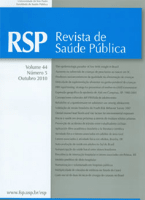
REVISTA DE SAUDE PUBLICA
Scope & Guideline
Cultivating a Legacy of Public Health Excellence
Introduction
Aims and Scopes
- Public Health Evaluation and Policy Analysis:
The journal focuses on evaluating public health interventions and policies, utilizing methodologies such as interrupted time series analysis and machine learning to assess health outcomes and program effectiveness. - Social Determinants of Health:
Research highlighting the influence of social, economic, and cultural factors on health outcomes is a central theme, with studies exploring disparities in health access and outcomes among marginalized populations. - Epidemiological Studies and Surveillance:
The journal publishes epidemiological research that tracks disease trends, risk factors, and health indicators, contributing to the understanding of public health challenges like COVID-19, obesity, and communicable diseases. - Nutritional and Dietary Research:
A significant focus on nutrition-related studies, addressing dietary patterns, food consumption, and their implications for public health, particularly in relation to chronic diseases and nutritional deficiencies. - Mental Health and Wellbeing:
The journal includes research on mental health issues, exploring the impact of social determinants, health policies, and interventions on mental wellbeing across different populations. - Healthcare Systems and Access:
Analyzing the performance of healthcare systems, including access to services, quality of care, and the impact of health policies on different demographic groups.
Trending and Emerging
- Impact of COVID-19 on Public Health:
The journal has increasingly featured research on the effects of the COVID-19 pandemic, including studies on vaccination, mental health impacts, and healthcare system responses. - Obesity and Chronic Disease Management:
There is a growing trend in research addressing obesity and related chronic diseases, reflecting an urgent public health concern in Brazil, particularly among children and adolescents. - Digital Health and Telemedicine:
Emerging themes include the use of digital health solutions and telemedicine in improving access to healthcare services, especially during the pandemic. - Health Inequalities and Social Justice:
Research focusing on health disparities related to race, gender, and socioeconomic status has gained momentum, highlighting the need for equitable health policies. - Food Security and Nutrition Interventions:
There is an increasing emphasis on food security, dietary patterns, and their implications for public health, particularly in the context of ultra-processed food consumption.
Declining or Waning
- Traditional Infectious Disease Focus:
Research on traditional infectious diseases has decreased as newer health challenges, such as non-communicable diseases and mental health issues, gain prominence in public health discussions. - Environmental Health Studies:
There appears to be a waning emphasis on studies that solely focus on environmental health impacts, particularly those not directly linked to public health outcomes or interventions. - Historical Health Research:
The journal has published fewer studies that focus on historical perspectives of health issues, possibly due to a shift towards contemporary and urgent public health challenges.
Similar Journals

Health Promotion and Chronic Disease Prevention in Canada-Research Policy and Practice
Fostering collaboration for effective chronic disease solutions.Health Promotion and Chronic Disease Prevention in Canada - Research Policy and Practice is a leading open-access journal published by the Public Health Agency Canada. This journal, indexed with the ISSN 2368-738X, is dedicated to advancing the field of health promotion while addressing chronic disease prevention in the Canadian context. Since its inception in 2008, it has gained a robust reputation, evidenced by its ranking in the second quartile (Q2) across multiple categories including Epidemiology, Health Policy, and Public Health, Environmental and Occupational Health. With its emphasis on research and policy implications, the journal serves as a critical resource for researchers, healthcare professionals, and students alike, aiming to promote evidence-based practices and driving discussions that shape public health policies. The journal is particularly noted for its triangulation of research findings into actionable strategies, making it relevant for both academic inquiry and practical application. Whether you are seeking to enhance your knowledge or contribute to the discourse on chronic disease prevention, this journal offers a platform for sharing impactful research and innovative ideas.
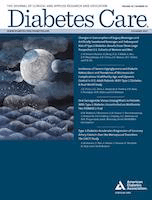
DIABETES CARE
Transforming knowledge into diabetes care solutions.DIABETES CARE, published by the American Diabetes Association, is a premier journal dedicated to advancing the understanding and management of diabetes and related metabolic disorders. Since its inception in 1978, this journal has maintained a commitment to disseminating high-quality research, evidenced by its prestigious ranking in the Q1 category across multiple fields including Advanced and Specialized Nursing, Endocrinology, Diabetes and Metabolism, and Internal Medicine. With an impressive impact factor and distinguished Scopus rankings, DIABETES CARE serves as an essential resource for researchers, clinicians, and students alike, facilitating the exchange of knowledge and fostering innovation in diabetes care. Although not an open-access publication, the journal offers various ways to access groundbreaking studies and advancements in the field. This commitment to excellence reflects the journal's vital role in shaping diabetes research and clinical practices globally.
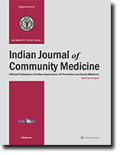
Indian Journal of Community Medicine
Transforming Community Health Through Collaborative KnowledgeIndian Journal of Community Medicine, with its ISSN 0970-0218 and E-ISSN 1998-3581, operates under the esteemed Wolters Kluwer Medknow Publications. This peer-reviewed, open access journal, established in 2005, has been at the forefront of disseminating research in the fields of public health, community medicine, and environmental health, forging connections among researchers, practitioners, and policymakers in India and beyond. With a notable impact factor and a Q3 ranking in Public Health, Environmental and Occupational Health for 2023, this journal maintains a commitment to improving community health through empirical research, policy analysis, and best practice sharing. The journal is pivotal not only in addressing prevalent health issues but also in fostering innovative solutions tailored to the unique challenges faced by diverse communities. With publication convergence from 2009 to 2024, the Indian Journal of Community Medicine continues to serve as a vital resource for academics, professionals, and students looking to contribute to and engage with the evolving landscape of community health research.
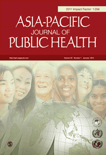
Asia-Pacific Journal of Public Health
Innovating solutions for diverse populations' health needs.Asia-Pacific Journal of Public Health, published by SAGE Publications Inc, is a leading platform for disseminating scholarly research in the field of public health. With an impressive scope that spans from the late 1980s to the present, the journal offers a wealth of articles that address critical issues faced by diverse populations in the Asia-Pacific region. Categorized in the Q3 quartile for both Medicine (miscellaneous) and Public Health, Environmental and Occupational Health, it holds a significant position within its field, ranked 310 out of 665 in the Scopus database. Researchers and professionals have access to valuable insights that inform public health policy and practice, making this journal an essential resource for those aiming to enhance health outcomes in the region. While not currently open access, the journal's rigorous peer-review process ensures the integrity and relevance of its content. As the landscape of public health continues to evolve, the Asia-Pacific Journal of Public Health remains a vital resource for advancing knowledge, fostering collaboration, and promoting a healthier society.
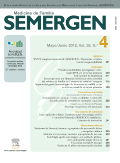
Medicina de Familia-SEMERGEN
Bridging the gap between research and practice in family medicine.Medicina de Familia-SEMERGEN is a pivotal Spanish journal focused on the field of family medicine and public health, published by the esteemed Elsevier. With an ISSN of 1138-3593 and an E-ISSN of 1578-8865, this journal provides a platform for researchers and practitioners to disseminate innovative studies, clinical practices, and case reports that advance the understanding of family healthcare dynamics. As of 2023, it is categorized in Q3 in Family Practice and Q4 in Public Health, reflecting its significant contributions to the respective fields. The journal is indexed in Scopus, holding ranks of 31/56 and 473/665 for family practice and public health respectively, showcasing its relevance in academic discourse. While maintaining a commitment to quality research, Medicina de Familia-SEMERGEN remains accessible for professionals seeking to improve patient outcomes in family medicine, making it an essential resource for anyone in the health domain.

Health Services Research and Managerial Epidemiology
Exploring the intersection of research and health management.Health Services Research and Managerial Epidemiology is an esteemed peer-reviewed journal published by SAGE Publications Inc, dedicated to advancing the fields of health services research and epidemiology. With the ISSN 2333-3928, this Open Access journal, available since 2014, aims to foster a deeper understanding of the managerial aspects of epidemiology and its implications for health service delivery. By offering insights into critical healthcare policies and practices, the journal serves as an important resource for researchers, practitioners, and students alike. As of 2023, it is classified in the Q3 quartile for both Epidemiology and Health Policy, ranking within the 31st and 30th percentiles, respectively, in Scopus rankings. The journal’s scope encompasses a wide variety of topics, ranging from health management practices to innovative research methodologies, making it a key platform for disseminating influential work that shapes health policy and public health strategies. Operating out of the United States, at 2455 Teller Rd, Thousand Oaks, CA 91320, it continues to push the boundaries of knowledge in an increasingly vital area of study.
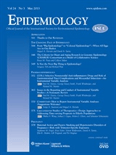
EPIDEMIOLOGY
Fostering collaboration for a healthier tomorrow.EPIDEMIOLOGY, published by Lippincott Williams & Wilkins, stands as a vital resource in the field of epidemiological research. With its ISSN 1044-3983 and E-ISSN 1531-5487, this journal has been a cornerstone for scholars since its inception in 1990. Covering a wide array of topics within the domain, it strives to disseminate cutting-edge findings that inform public health policies and clinical practices. Currently ranked Q3 in Epidemiology and positioned at #33 out of 148 according to Scopus, the journal boasts an impressive 78th percentile rank, reflecting its significance and impact within the academic community. Though not open access, EPIDEMIOLOGY provides robust access options for institutional subscribers, ensuring that critical epidemiological insights reach a broad audience. As this field continues to evolve, the journal remains dedicated to empowering researchers, practitioners, and students with the knowledge necessary to advance public health initiatives and improve population health outcomes.

Archivos de Medicina
Advancing Medical Knowledge for AllArchivos de Medicina is a prominent open-access journal published by the Universidad de Manizales, Facultad de Medicina, dedicated to advancing the field of medical sciences. With an ISSN of 1657-320X and an E-ISSN of 2339-3874, this journal has been a key resource for researchers and healthcare professionals since its inception in 2012, facilitating the broad dissemination of high-quality, peer-reviewed research. Its commitment to open access ensures that critical medical research is available to all, promoting collaboration and innovation across various disciplines. Archivos de Medicina aims to publish original articles, reviews, and case studies that contribute to the understanding and improvement of health systems, medical practice, and public health. By fostering an international dialogue among scholars and practitioners, the journal plays a vital role in shaping evidence-based medicine, making it an invaluable resource for anyone dedicated to advancing healthcare knowledge and practice.
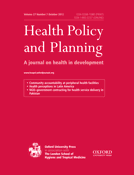
HEALTH POLICY AND PLANNING
Advancing Global Health Through Strategic Policy Analysis.HEALTH POLICY AND PLANNING is a prestigious academic journal published by Oxford University Press that focuses on the critical issues related to health policy and its impact on global health systems. Since its inception in 1986, this journal has rapidly established itself in the field, holding a distinguished position in the Q1 category of Health Policy, with a notable Scopus ranking of #57 out of 310, placing it in the 81st percentile. By providing a platform for empirical research, theoretical analyses, and policy discussions, HEALTH POLICY AND PLANNING aims to contribute to the development and improvement of health policies worldwide. As a valuable resource for researchers, professionals, and students alike, it fosters a deeper understanding of health system challenges and encourages the dissemination of innovative solutions. Although the journal does not offer open access, it remains an essential publication for those engaged in shaping the future of global health policy.

MILBANK QUARTERLY
Shaping Global Health Policy with Scholarly ExcellenceThe Milbank Quarterly is a preeminent scholarly journal published by Wiley that focuses on a range of vital issues in health policy and public health. With an impressive impact factor underscored by its Q1 rankings in both health policy and public health, the journal serves as an essential resource for researchers and professionals seeking to influence health systems and policies on a global scale. Since its establishment in 1986, The Milbank Quarterly has maintained a commitment to rigorous research and innovative analysis, and it continues to provide a platform for groundbreaking studies that address contemporary challenges in health care. Although it does not currently offer open access, the journal features a comprehensive review process that ensures the publication of high-quality articles aiming to inform policy decisions and elevate public health practices, confirming its status within the top ranks of its field.